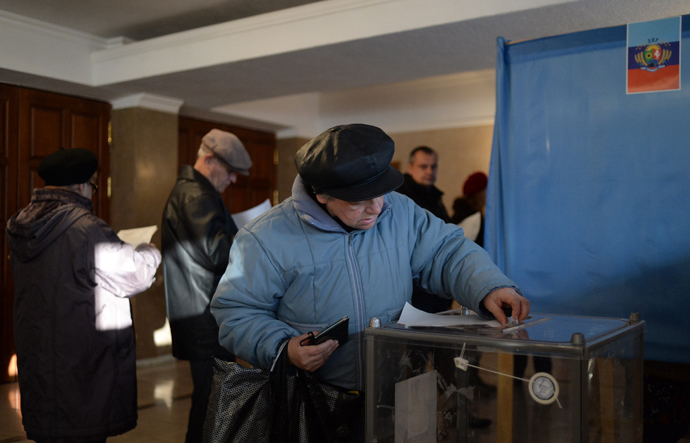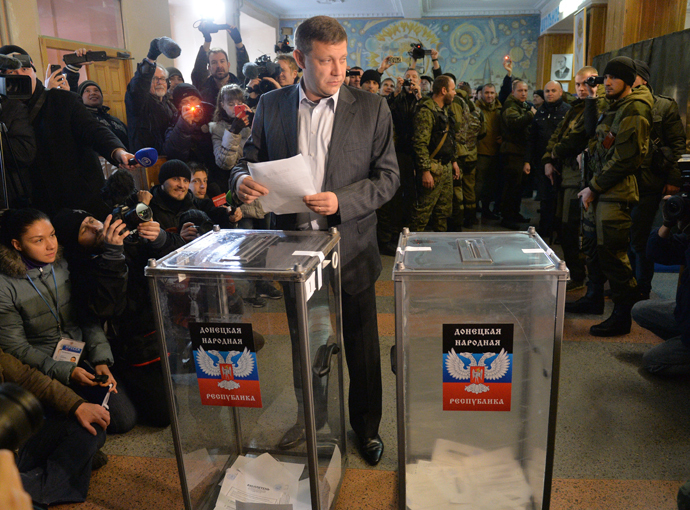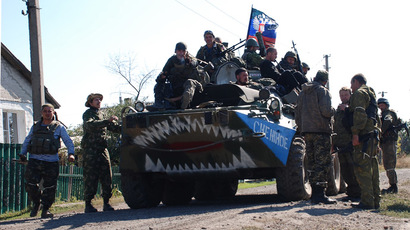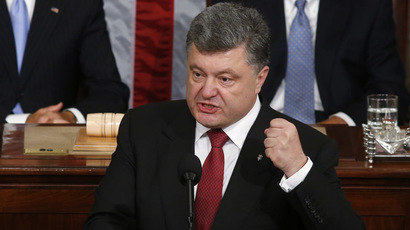Donbass self-proclaimed republics vote to elect leaders, MPs
The self-proclaimed people’s republics of Donetsk and Lugansk are electing their leaders and MPs. The Kiev government has started criminal proceedings against elections in the southeast despite them being sanctioned by the Minsk peace deal.
As soon as the polling stations opened at 8 am on Sunday morning, high voter activity was noted in both the Donetsk and Lugansk regions. After presenting valid, local registration, voters get two ballots: one for the parliamentary election and one to vote for the future leaders of the republics.
At the dawn of winter, the people of #Donetsk decide their future - free, hopeful and eager for change. pic.twitter.com/R5pMRwMqgg
— PaulaSlier_RT (@PaulaSlier_RT) November 2, 2014
There are over 360 polling stations in Donetsk, where potentially more than three million voters can cast their votes. Armed militia members are guarding each polling station. In the Lugansk People’s Republic, there are 102 polling stations for approximately 1.5 million voters.
The three main candidates: Alexander Zakharchenko, Yuri Sivokonenko and Alexander Kofman. pic.twitter.com/iGnWZrtqYa
— PaulaSlier_RT (@PaulaSlier_RT) November 2, 2014
The area in Donetsk where the Central Election Committee is situated is being heavily guarded, with all surrounding streets cordoned off.
Lugansk has seen queues at some polling stations, as large number of voters came to cast their votes early in the morning.
RT’s correspondent Paula Slier reported from the scene, saying
that she “found the same feelings from voters in all polling
stations visited. Today, the people stand united.”
"If Kiev can do it, so can we," one voter in Donetsk
told Slier.

“Our opinion was simply ignored [by Kiev authorities] when we took part in the [independence] referendum [in May], now it’s time to take the people’s will into account; that’s why I have come today to cast my vote,” another voter in Donetsk told the Itar-Tass news agency.
The interminable queues are the small price paid for their first, truly democratic vote in a long time. pic.twitter.com/Wg2vmACQMJ
— PaulaSlier_RT (@PaulaSlier_RT) November 2, 2014
In Russia’s neighboring Belgorod, Rostov and Voronezh regions, where thousands of refugees from Donetsk and Lugansk are currently living, polling stations have also been set up.
Foreign observers note high turnout
At least 70 observers from a number of countries, including
France, Italy, Lithuania, Poland, Russia, Israel, Great Britain
and others are monitoring the elections. However, observers from
the OSCE are not attending.
An MP from the upper Chamber of Italy’s Parliament, Lucio Malan,
acting as an observer at the elections in Donetsk praised the
high standards of the elections, RIA Novosti reported.
The elections in Lugansk People’s Republic were carried out in
accordance with international democratic norms, Manuel
Ochsenreiter, editor-in-chief of Zuerst!, the German weekly, told
TASS news agency.
He also observed a high turnout at the polling stations. "We
have just visited a polling station that was filled to capacity.
My first impression is that people are showing huge interest in
the elections," Ochsenreiter said.
Violations have not been reported at the polling stations,
Israeli observer Max Laurier, told TASS.
"Together with other international observers I've visited
several polling stations in Donetsk. I want to note people's big
interest in the elections: people have queued at polling
stations. In general, the work of district election commissions
is organized well," Laurier said.
Meanwhile, Ukraine’s Security Service said on Sunday that it
plans to include foreign observers, who attended the Donbass
elections, in a list of "persona non grata” because it
considers their activity “criminal.”

In Donetsk, there are three candidates for leader, including acting Prime Minister Aleksandr Zakharchenko. He was among the very first to cast his vote, and he told journalists that after the election Kiev would have to deal with the self-proclaimed Donetsk People’s Republic as equal.
Instead, Kiev has announced it has begun a criminal prosecution against election organizers in Donetsk and Lugansk, despite the fact that peace agreements reached in Minsk in September between the Ukrainian authorities and the self-proclaimed republics specifically outlined the necessity of conducting early elections.
Ukraine’s Security Service explained in a statement on its Facebook page that Kiev considers the elections illegal, as they violate Ukrainian legislation. Kiev insisted to honor the Minsk arrangement, under which local elections should be held in December, as stipulated in a decree signed by President Poroshenko.
PM Aleksandr Zakharchenko has promised to launch criminal proceedings against Kiev in a tit-for-tat measure.
“If the Security Service of Ukraine launches a criminal investigation into elections in Donetsk People’s Republic, then we will start criminal prosecution against Kiev on a charge of genocide,” Zakharchenko told the Russian News Service.
“Since we’re not afraid of them shelling us, then their prosecution is not a big deal either,” he said, stressing that the people of the republic have made their choice and are not going to change it.
The Russian Foreign Ministry earlier pointed out that the Minsk peace agreements established in early September that elections in both Ukraine and the self-proclaimed republics should be conducted between October 19 and November 3. Kiev authorities conducted parliamentary elections a week ago, on October 26. Ukrainian President Petro Poroshenko’s order from October 16 setting the date of elections in the self-proclaimed republics for December 7 “contradicts the Minsk agreements,” said the Russian Foreign Ministry.
Early last week, Russia’s Foreign Minister Sergey Lavrov said in an interview to Izvestia daily and Lifenews that Moscow will recognize the results of the elections in Ukraine’s self-proclaimed republics.
“The elections taking place on November 2 in Donetsk and Lugansk are very important for the legitimization of their authority,”Lavrov said, noting that such elections are an important constituent of the Minsk peace agreements between Kiev and the self-proclaimed republics.
“We expect elections to take place as previously agreed,” Lavrov said, “and, naturally, we will recognize the results. We look forward to the free expression of the will of the people and that no external forces will try to disrupt them,” Russia’s foreign minister added.














